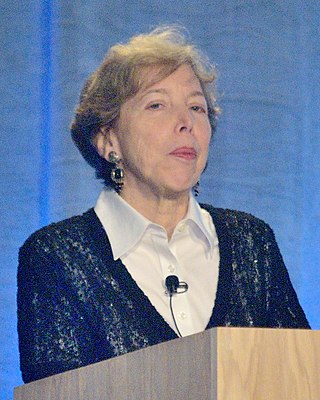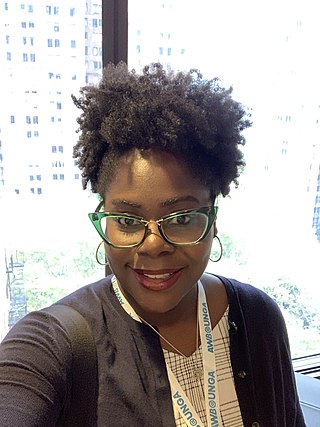Related Research Articles

Eugene Howard Spafford, known as Spaf, is an American professor of computer science at Purdue University and a computer security expert.

Susan Lois Graham is an American computer scientist. Graham is the Pehong Chen Distinguished Professor Emerita in the Computer Science Division of the Department of Electrical Engineering and Computer Sciences at the University of California, Berkeley.

Annie Antón is an academic and researcher in the fields of computer science, mathematical logic, and bioinformatics.
Elizabeth D. "Beth" Mynatt is the Dean of the Khoury College of Computer Sciences at Northeastern University. She is former executive director of the Institute for People and Technology, director of the GVU Center at Georgia Tech, and Regents' and Distinguished Professor in the School of Interactive Computing, all at the Georgia Institute of Technology.
Ming C. Lin is an American computer scientist and a former chair of the Department of Computer Science at the University of Maryland, College Park, where she also holds an endowed faculty position as the Elizabeth Stevinson Iribe Chair of Computer Science. Prior to moving to Maryland in 2018, Lin was the John R. & Louise S. Parker Distinguished Professor of Computer Science at the University of North Carolina at Chapel Hill.
Owen Astrachan is an American computer scientist and professor of the practice of computer science at Duke University, where he is also the department's director of undergraduate studies. He is known for his work in curriculum development and methods of teaching computer science. He was one of the first National Science Foundation CISE Distinguished Education Fellows, and is a recipient of the ACM Outstanding Educator Award. He was the principal investigator on the multi-year NSF/College Board project that led to the release of the AP Computer Science Principles course and exam.

Carla Schlatter Ellis is an American computer scientist and Emeritus Professor of Computer Science at Duke University. She is known for her work in energy management on mobile devices as well as for her dedication to increasing the number of women in the field of computer science. She is one of the founding members of Systers, an international email list of female computer scientists that was founded in 1987. Systers, which was initiated by Ellis and 12 other female computer scientists who met at a Symposium on Operating Systems Principles (SOSP), has since grown to over 3000 members.
Margaret Martonosi is an American computer scientist who is currently the Hugh Trumbull Adams '35 Professor of Computer Science at Princeton University. Martonosi is noted for her research in computer architecture and mobile computing with a particular focus on power-efficiency.

Susan H. Rodger is an American computer scientist known for work in computer science education including developing the software JFLAP for over twenty years. JFLAP is educational software for visualizing and interacting with formal languages and automata. Rodger is also known for peer-led team learning in computer science and integrating computing into middle schools and high schools with Alice. She is also currently serving on the board of CRA-W and was chair of ACM SIGCSE from 2013 to 2016.

Lise Getoor is a professor in the computer science department, at the University of California, Santa Cruz, and an adjunct professor in the Computer Science Department at the University of Maryland, College Park. Her primary research interests are in machine learning and reasoning with uncertainty, applied to graphs and structured data. She also works in data integration, social network analysis and visual analytics. She has edited a book on Statistical relational learning that is a main reference in this domain. She has published many highly cited papers in academic journals and conference proceedings. She has also served as action editor for the Machine Learning Journal, JAIR associate editor, and TKDD associate editor.
Nancy Marie Amato is an American computer scientist noted for her research on the algorithmic foundations of motion planning, computational biology, computational geometry and parallel computing. Amato is the Abel Bliss Professor of Engineering and Head of the Department of Computer Science at the University of Illinois at Urbana-Champaign. Amato is noted for her leadership in broadening participation in computing, and is currently a member of the steering committee of CRA-WP, of which she has been a member of the board since 2000.
African-American women in computer science were among early pioneers in computing in the United States, and there are notable African-American women working in computer science.

Valerie Elaine Taylor is an American computer scientist who is the director of the Mathematics and Computer Science Division of Argonne National Laboratory in Illinois. Her research includes topics such as performance analysis, power analysis, and resiliency. She is known for her work on "Prophesy," described as "a database used to collect and analyze data to predict the performance on different applications on parallel systems."
Robert B. Schnabel is an American computer scientist. He was executive director and CEO of the Association for Computing Machinery (ACM) from November 1, 2015 to 2017. He is now professor and external chair of computer science at University of Colorado Boulder.
Valerie Barr is an American computer scientist, and is the Margaret Hamilton Distinguished Professor of Computer Science at Bard College. She formerly held the Jean Sammet endowed chair in the department of Computer Science at Mount Holyoke College in South Hadley, Massachusetts. She is known for her work with women in computing.
Sarah Ann Douglas is a distinguished computer scientist, known for her work in human-computer interaction (HCI), a field of computer science that she has helped pioneer, and, in particular, pointing devices and haptic interactions, WWW interfaces and bioinformatics, and visualization and visual interfaces. She is a Professor Emerita of Computer and Information Science and a member of the Computational Science Institute at the University of Oregon.
Latifur Khan joined the University of Texas at Dallas in 2000, where he has been conducting research and teaching as a Professor in the Department of Computer Science.
Shaundra Bryant Daily is an American professor and author known for her work in the field of human-centered computing and broadening participation in STEM. She is a professor in the Department of Electrical and Computer Engineering and Computer Science at Duke University.

Quincy K. Brown is an American computer scientist and former Senior Policy Advisor in the White House Office of Science and Technology Policy. She is a published academic and co-founder of blackcomputeHER.org, NationOfMakers.org and Black In Computing.
Jessica Hullman is a computer scientist and the Ginni Rometty associate professor of Computer Science at Northwestern University. She is known for her research in Information visualization.
References
- 1 2 3 4 5 "Meet Duke's new faculty of 2020". Duke Stories. 2020-10-13. Archived from the original on 2022-02-04. Retrieved 2022-02-04.
- 1 2 Vara, Vauhini (22 August 2014). "Pandora and the White Male". The New Yorker . Archived from the original on 2018-04-10. Retrieved 2022-02-04.
- ↑ Chen, Te-Ping (3 June 2020). "For Black Professionals, Unrest Lays Bare a Balancing Act at Work". Wall Street Journal . ISSN 0099-9660. Archived from the original on 2022-02-04. Retrieved 2022-02-04.
- ↑ "People of ACM: Nicki Washington". www.acm.org. Archived from the original on 2022-02-06. Retrieved 2022-02-06.
- ↑ "Nicki Washington". SXSW EDU 2022 Schedule. Archived from the original on 2022-02-04. Retrieved 2022-02-04.
- 1 2 3 Mahoney, Ashley (27 August 2021). "JCSU graduate widens opportunities in computer science field". The Charlotte Post . Archived from the original on 2022-02-04. Retrieved 2022-02-04.
- ↑ Jackson, Charreah; Gallagher, Demetria; Wilson, Kimberly (March 2019). "15 Black Women Disrupting the Tech Industry". Essence . p. 85.
- ↑ Elias, Jennifer (21 February 2021). "Google's program for Black college students suffered disorganization and culture clashes, former participants say". CNBC . Archived from the original on 2022-02-04. Retrieved 2022-02-04.
- ↑ Newsome, Melba (27 October 2021). "How tackling tech's diversity challenges can spur innovation". MIT Technology Review . Archived from the original on 2022-02-04. Retrieved 2022-02-04.
- ↑ "NSF Award Search: Award # 2118453 - NSF INCLUDES Alliance: The Alliance for Identity-Inclusive Computing Education (AIICE): A Collective Impact Approach to Broadening Participation in Computing". National Science Foundation . Archived from the original on 2022-02-04. Retrieved 2022-02-04.